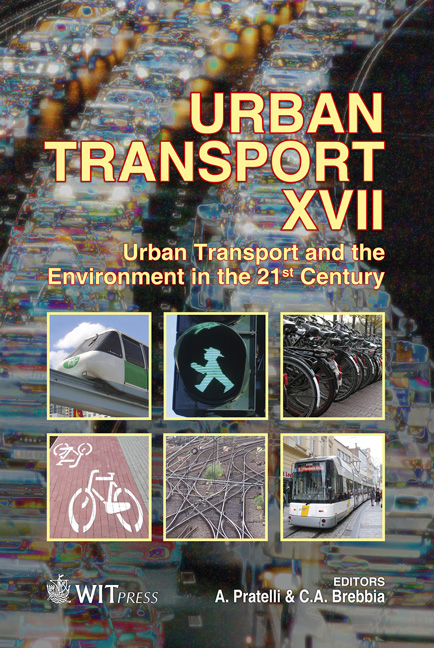Estimation Of Time-dependent O–D Demand And Route Choice From Link Flows
Price
Free (open access)
Transaction
Volume
116
Pages
11
Page Range
411 - 421
Published
2011
Size
2,900 kb
Paper DOI
10.2495/UT110351
Copyright
WIT Press
Author(s)
R. He
Abstract
Given time-dependent link traffic flow of a network, we propose a Maximum Likelihood Estimation (MLE) approach to estimate the parameters of dynamic route choice and time-dependent O–D demand simultaneously with consideration of dependencies among paths and links with repeated sampling, as well as some flow propagation information by utilizing time-dependent traffic data and any historical traffic information. By presenting approximate joint probability distribution functions of the temporal link traffic flows on a network, the full likelihood functions for estimating dynamic O–D and route choice parameters are derived with investigation of parameter identifiability. Although the methods can be applied using link flow data alone, incorporation of prior information into the inferential process is also discussed. The impact of sample size and the sensitivity to the number of O–D pairs and measurement errors have also been studied. The numerical example demonstrated that estimation of O–D matrix and dynamic route choices, as well as some flow propagation information, is feasible based on repeated-sampled link flow data alone. Keywords: dynamic O–D demand, dynamic route choice, maximum likelihood estimation (MLE), flow propagation, DTA, repeated sampling. 1 Introduction Dynamic Traffic Assignment (DTA) is a process of assigning time-dependent origin-destination (O–D) trips through a transportation network. Both analytical and simulation-based DTA models can adopt Dynamic User Optimal (DUO) or Stochastic Dynamic User Optimal (SDUO) principles to estimate travelers’ route choice and provide a close-reality solution of time-dependent traffic conditions for evaluation and management. Both models require time-dependent O–D
Keywords
dynamic O–D demand, dynamic route choice, maximum likelihood estimation (MLE), flow propagation, DTA, repeated sampling





